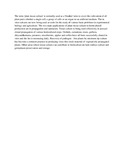| dc.contributor.author | Waithaka, K | |
| dc.date.accessioned | 2013-06-14T06:56:01Z | |
| dc.date.available | 2013-06-14T06:56:01Z | |
| dc.date.issued | 1988 | |
| dc.identifier.citation | Waithaka, K. 1988. Application Of Plant Tissue Culture In Horticultural Production. Acta Hort. (ishs) 218:131-140 | en |
| dc.identifier.uri | http://www.actahort.org/books/218/218_18.htm | |
| dc.identifier.uri | http://hdl.handle.net/11295/33545 | |
| dc.description.abstract | The term 'plant tissue culture' is normally used as a 'blanket' term to cover the cultivation of all plant parts whether a single cell, a group of cells or an organ on an artificial medium. The in vitro cultures are now being used as tools for the study of various basic problems in experimental biology and agriculture. The two main applications of plant tissue culture in horticultural production are in propagation and sanitation. Tissue culture is being used effectively in asexual clonal propagation of various horticultural crops. Orchids, carnations, roses, gerbera, chrysanthemums, potatoes, strawberries, apples and coffee have all been successfully cloned in vitro and the list is increasing daily. Recovery of pathogen - free plants by meristem tip culture has become a common practice in producing virus-free stock material of vegetatively propagated plants. Other areas where tissue culture can contribute to horticulture include embryo culture and germplasm preservation and storage. | en |
| dc.language.iso | en | en |
| dc.publisher | University of Nairobi | en |
| dc.title | Application Of Plant Tissue Culture In Horticultural Production | en |
| dc.type | Presentation | en |
| local.publisher | College of Agriculture and Veterinary Sciences | en |

